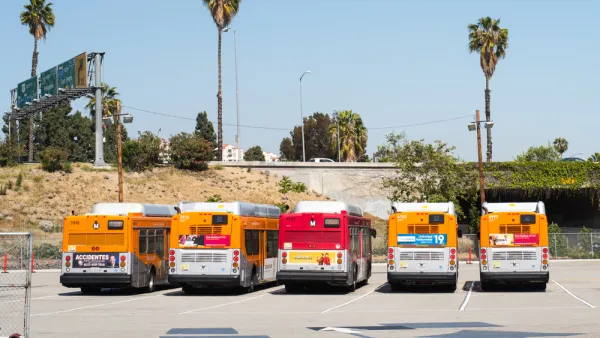With urban populations growing, an interesting phenomenon is spreading in cities across the U.S. - the rise of the (often congested) reverse commute. It brings with it new challenges, like how to provide transit riders with last mile connections.
"Over the past couple of decades, suburban job growth has exploded, but in recent years, there's also been a renaissance in urban living, especially among young professionals. The result: In some cities, traffic on the reverse commute is as congested as or worse than traffic going into the city," reports David Schaper in the latest piece in NPR's special series on U.S. commutes.
In Chicago, this has resulted in "surging population growth" along rail lines, "especially those leading to the suburbs," he adds.
"'It's an opportunity, but it also presents a big challenge for the transit market,' says Leanne Redden, who oversees planning for the Regional Transportation Authority of Chicago. Redden says the challenge is getting reverse commuters the last couple of miles from suburban stations to the sprawling corporate campuses and office parks along the highways."
Shuttle buses, van pools, and car and bike sharing are among the solutions being put forth for making the "last mile" connection.
FULL STORY: Reverse Commutes Now Often A Daily Slog, Too

Analysis: Cybertruck Fatality Rate Far Exceeds That of Ford Pinto
The Tesla Cybertruck was recalled seven times last year.

National Parks Layoffs Will Cause Communities to Lose Billions
Thousands of essential park workers were laid off this week, just before the busy spring break season.

Retro-silient?: America’s First “Eco-burb,” The Woodlands Turns 50
A master-planned community north of Houston offers lessons on green infrastructure and resilient design, but falls short of its founder’s lofty affordability and walkability goals.

Test News Post 1
This is a summary

Analysis: Cybertruck Fatality Rate Far Exceeds That of Ford Pinto
The Tesla Cybertruck was recalled seven times last year.

Test News Headline 46
Test for the image on the front page.
Urban Design for Planners 1: Software Tools
This six-course series explores essential urban design concepts using open source software and equips planners with the tools they need to participate fully in the urban design process.
Planning for Universal Design
Learn the tools for implementing Universal Design in planning regulations.
EMC Planning Group, Inc.
Planetizen
Planetizen
Mpact (formerly Rail~Volution)
Great Falls Development Authority, Inc.
HUDs Office of Policy Development and Research
NYU Wagner Graduate School of Public Service



























